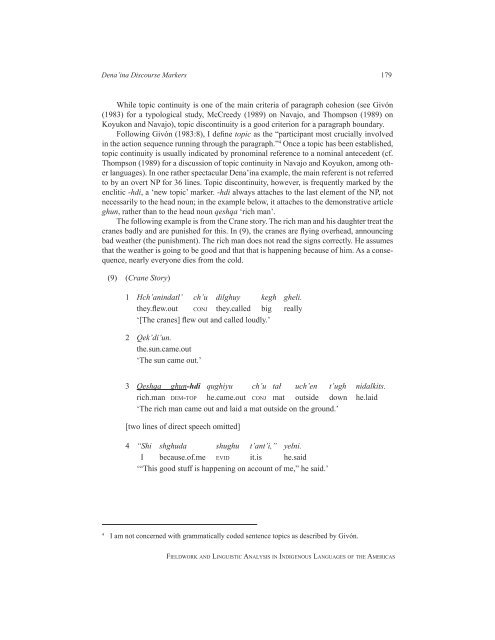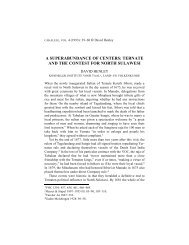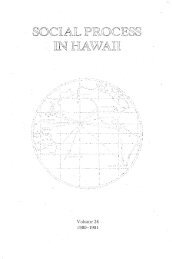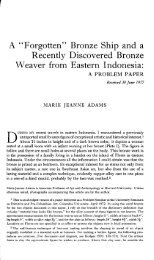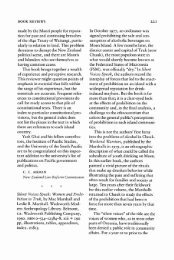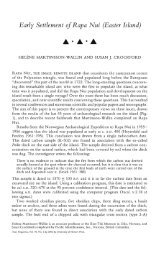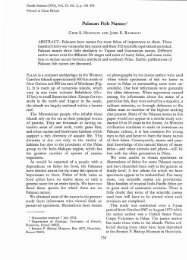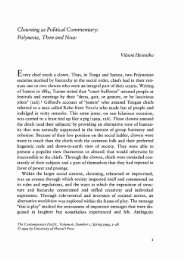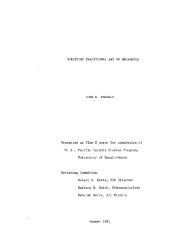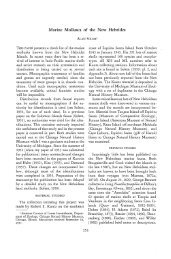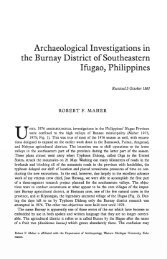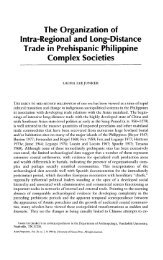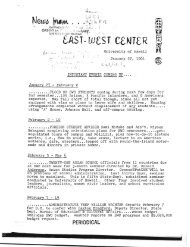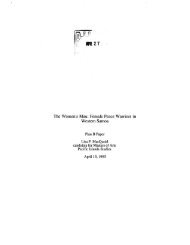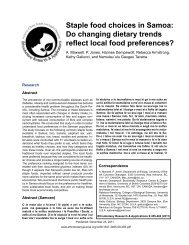Fieldwork and Linguistic Analysis in Indigenous ... - ScholarSpace
Fieldwork and Linguistic Analysis in Indigenous ... - ScholarSpace
Fieldwork and Linguistic Analysis in Indigenous ... - ScholarSpace
You also want an ePaper? Increase the reach of your titles
YUMPU automatically turns print PDFs into web optimized ePapers that Google loves.
Dena’<strong>in</strong>a Discourse Markers 179<br />
While topic cont<strong>in</strong>uity is one of the ma<strong>in</strong> criteria of paragraph cohesion (see Givón<br />
(1983) for a typological study, McCreedy (1989) on Navajo, <strong>and</strong> Thompson (1989) on<br />
Koyukon <strong>and</strong> Navajo), topic discont<strong>in</strong>uity is a good criterion for a paragraph boundary.<br />
Follow<strong>in</strong>g Givón (1983:8), I def<strong>in</strong>e topic as the “participant most crucially <strong>in</strong>volved<br />
<strong>in</strong> the action sequence runn<strong>in</strong>g through the paragraph.” 4 Once a topic has been established,<br />
topic cont<strong>in</strong>uity is usually <strong>in</strong>dicated by pronom<strong>in</strong>al reference to a nom<strong>in</strong>al antecedent (cf.<br />
Thompson (1989) for a discussion of topic cont<strong>in</strong>uity <strong>in</strong> Navajo <strong>and</strong> Koyukon, among other<br />
languages). In one rather spectacular Dena’<strong>in</strong>a example, the ma<strong>in</strong> referent is not referred<br />
to by an overt NP for 36 l<strong>in</strong>es. Topic discont<strong>in</strong>uity, however, is frequently marked by the<br />
enclitic -hdi, a ‘new topic’ marker. -hdi always attaches to the last element of the NP, not<br />
necessarily to the head noun; <strong>in</strong> the example below, it attaches to the demonstrative article<br />
ghun, rather than to the head noun qeshqa ‘rich man’.<br />
The follow<strong>in</strong>g example is from the Crane story. The rich man <strong>and</strong> his daughter treat the<br />
cranes badly <strong>and</strong> are punished for this. In (9), the cranes are fly<strong>in</strong>g overhead, announc<strong>in</strong>g<br />
bad weather (the punishment). The rich man does not read the signs correctly. He assumes<br />
that the weather is go<strong>in</strong>g to be good <strong>and</strong> that that is happen<strong>in</strong>g because of him. As a consequence,<br />
nearly everyone dies from the cold.<br />
(9) (Crane Story)<br />
1 Hch’an<strong>in</strong>datl’ ch’u dilghuy kegh gheli.<br />
they.flew.out conJ they.called big really<br />
‘[The cranes] flew out <strong>and</strong> called loudly.’<br />
2 Qek’di’un.<br />
the.sun.came.out<br />
‘The sun came out.’<br />
3 Qeshqa ghun-hdi qughiyu ch’u tał uch’en t’ugh nidalkits.<br />
rich.man dem-toP he.came.out conJ mat outside down he.laid<br />
‘The rich man came out <strong>and</strong> laid a mat outside on the ground.’<br />
[two l<strong>in</strong>es of direct speech omitted]<br />
4 “Shi shghuda shughu t’ant’i,” yełni.<br />
I because.of.me evid it.is he.said<br />
‘“This good stuff is happen<strong>in</strong>g on account of me,” he said.’<br />
4 I am not concerned with grammatically coded sentence topics as described by Givón.<br />
fieldwork <strong>and</strong> l<strong>in</strong>guistic analysis <strong>in</strong> <strong>in</strong>digenous languages of the americas


